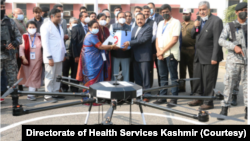As the world races to vaccinate billions more people against COVID-19 while the virus’ new omicron variant spreads, India is testing using drones to deliver vaccines to people in mountainous Jammu and Kashmir, where more than 70% of the population lives in rural areas.
It typically takes a couple hours by road to deliver vaccines from one of the region’s main medical centers in Jammu to a hospital located in Marh, a village in mountains nearby. Last month, officials said the delivery took just 20 minutes by the “Octacopter” drone.
Doctors say immunization campaigns have long been challenged by the region’s mountains and weather, which can thwart efforts to reach those living in remote areas.
Director of Health Services Jammu, Dr. Renu Sharma, told VOA that the trial last month delivering 200 doses gave hope that drones could be a useful delivery option.
“If the project is given [approved] it will be very helpful for remote areas especially in Jammu division given the difficult terrain,” Sharma said.
Other parts of Kashmir remain inaccessible for vehicles at times, making drones a better option.
“The areas like Sikardar, Safaid Aab, and Marno are challenging especially in winters. It takes us six to eight hours on foot from Dawar to reach to these areas,” Bashir Ahmad Peroo, a health worker from Gurez area, told VOA.
A spokesperson for the Directorate of Health Services Kashmir, Dr. Mir Mushtaq, told VOA that doctors now often stock enough medicine in the summer to last the local population all winter. Drones could help bolster supplies during the cold months.
Its creators say the Octacopter can carry a payload of 10 kilograms, with a range of 20 kilometers, and a maximum speed of 36 kph.
India’s CSIR-National Aerospace Laboratories developed the Octocopter drones and the country’s minister of state for science and technology, Dr. Jitendra Singh, said they hope they will be able to deliver more than just COVID-19 vaccines, including medical supplies, equipment, and critical packages to remote communities.
Indian health statistics indicate more than 4,400 people have died from coronavirus in Jammu and Kashmir, and doctors say since late last month there has been a rise in the number of new positive tests each day, making the vaccination campaign ever more important.




